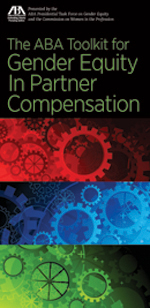Pay equality for women attorneys: The ABA Toolkit for Gender Equity in Partner Compensation
 Illinois State Bar Association President Paula H. Holderman has outlined her vision for this 2013-2014, which includes continuing the path towards gender equality in the legal profession. One way Illinois law firms can join Paula Holderman and the Illinois State Bar Association in this effort is through the implementation of the ABA Toolkit for Gender Equity in Partner Compensation.
Illinois State Bar Association President Paula H. Holderman has outlined her vision for this 2013-2014, which includes continuing the path towards gender equality in the legal profession. One way Illinois law firms can join Paula Holderman and the Illinois State Bar Association in this effort is through the implementation of the ABA Toolkit for Gender Equity in Partner Compensation.
Last year, under the leadership of President Laurel Bellows, the American Bar Association formed the Task Force on Gender Equity and the Commission on Women in the Profession, which focused on finding solutions for eliminating gender bias latent in the legal profession. The Task Force focused first on the most obvious indicator of success, compensation. Research previously conducted by the ABA clearly shows a pervasive compensation gap between men and women at the partner level in the nation’s largest law firms. This is true even when hours and business development were controlled for. The results of the research indicate that the root of this compensation disparity is subjective compensation systems with little transparency.
While these results show an overt unfairness in compensation structures for individual women, the systemic impact is far greater. Why? Because, when women partners are not appropriately compensated, they leave their firms and often leave the legal profession altogether. According to the NAWL annual reports on Retention and Promotion of Women in Law Firms, the percentage of female equity partners in American law firms has remained stagnant at 15% for years. What law firms fail to realize when determining attorney compensation is that the attrition of women attorneys from the time they are hired as associates to their eligibility for partner equals a loss of talent and diversity that ultimately impacts the bottom line of law firms.
Compensation is a marker for even greater equality in the law firm work environment. When pay is equalized it is much more likely that there will also be equity in assignments as well as decision-making involvement within a firm. The overall effect of marginalization is eliminated, allowing talent to prevail.
Many firms are recognizing that the future of the legal profession integrally aligns with women. However, when it comes to compensation practices, many firms do not know how to begin the reform process to better ensure pay equity within their firms. In response to this need the Task Force developed the ABA Toolkit for Gender Equity in Partner Compensation. The Toolkit provides everything needed to present an awareness and education seminar of varying lengths geared toward equity partner decision-makers in mid-large Illinois firms. The tool kit includes proposed agendas, power-point slides, reading materials, resources and marketing strategies for firms to use in sharing their diversity leadership as part of an overall strategy for generating business.
Illinois is home to hundreds of law firms and most of the largest firms in the nation have large offices in Chicago. Women now make up 50% of enrolled law students and the percentage of women attorneys working in firms is on the rise in Illinois. The time is now to implement policies and practices for attorney compensation that will encourage the women coming into the professions and young women lawyers working in firms today to stay the course and rise to the level of leadership alongside our male counterparts. The ABA Toolkit for Gender Equity in Partner Compensation can show us the way.
To learn more visit the Taskforce Web site at <http://www.americanbar.org/groups/women/gender_equity_task_force.html>.
